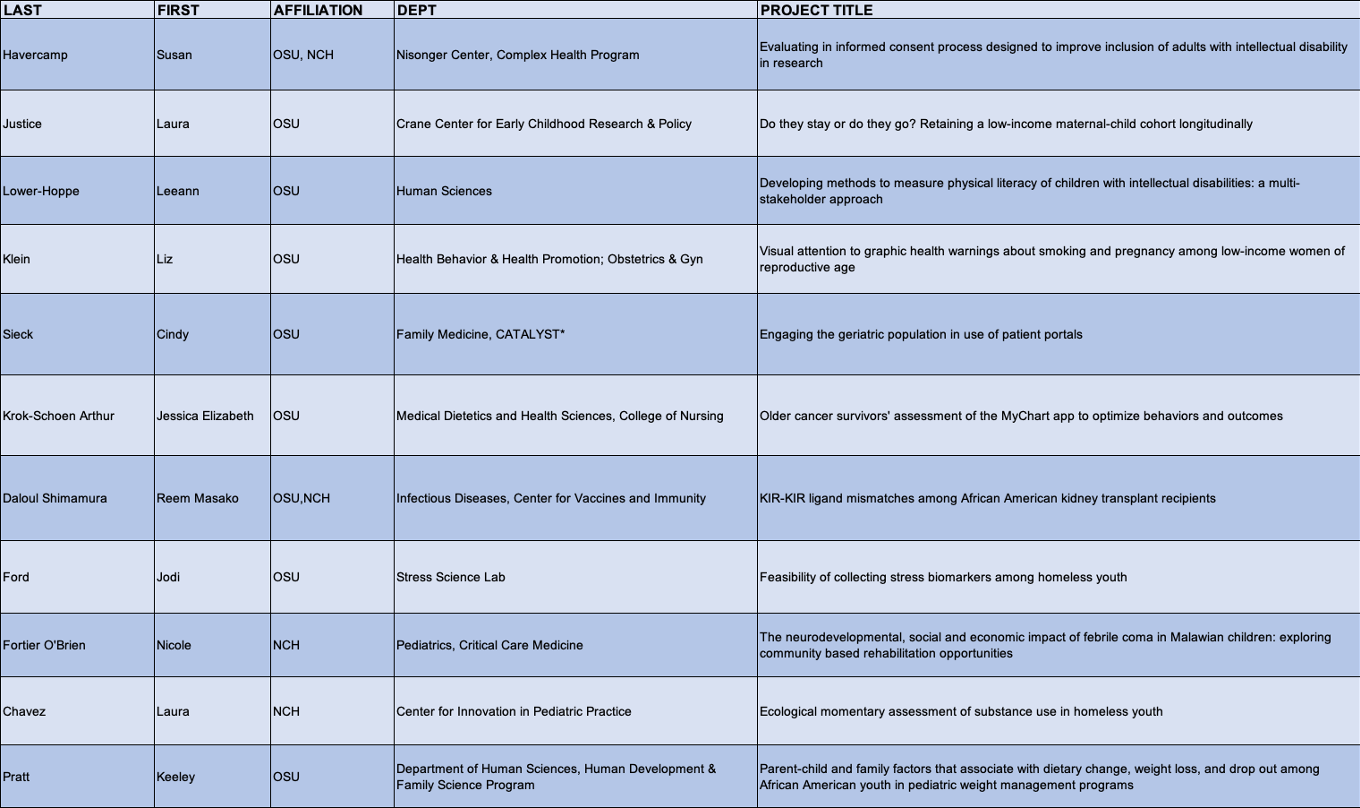Integrating Special Populations Program
As part of the Center for Clinical and Translational Science at The Ohio State University and Nationwide Children’s Hospital, the Integrating Special Populations (ISP) Program was designed to address the underrepresentation of special populations in clinical and translational research.
The term “Special Populations” encompasses a multitude of groups and communities that are commonly underrepresented in clinical and translational research. These include, but are not limited to, the following groups:
- Fetuses, neonates and children
- Pregnant or nursing women
- Older adults
- Individuals with physical disabilities
- Individuals with communication or sensory impairments (hearing, vision, etc.)
- Racial, ethnic or cultural minorities
- Non-English speaking individuals
- Underinsured or socioeconomically disadvantaged patients
- Gender or sexual minorities (LGBTQ+)
- Individuals with intellectual disabilities
- Isolated urban or rural communities
Socioeconomic or demographic factors may contribute to the systematic underrepresentation of special populations, regardless of whether these groups are explicitly targeted for research participation. Historical cases of research misconduct have also ingrained a deep-rooted mistrust of the medical establishment in certain communities.
Investigators often encounter additional challenges when recruiting or retaining special populations for research, such as how to effectively obtain informed consent for individuals with intellectual disabilities or how to ensure success for a study requiring multiple clinic visits for individuals.
As part of the Integrating Special Populations (ISP) program, the Executive Committee on Lifespan Research (ECLR) is a consultation service that aims to increase the inclusion of special populations currently underrepresented in clinical and translational science by providing resources to faculty, trainees and research staff conducting research at Ohio State and Nationwide Children's Hospital.
Consultations will focus on the adoption of inclusive methods for longitudinal research with special populations across the lifespan, developmental stages (e.g., adolescence to adult), health systems (e.g., curative to hospice care), and interconnected family units (e.g., maternal-child health). The Committee will provide interdisciplinary expertise and serve as a centralized resource for investigators and their research teams.
ECLR oversees the ISP Pilot Program and is comprised of clinical research faculty with extensive expertise on special populations across the lifespan.
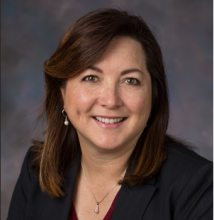
Cynthia Gerhardt, PhD, ISP Program Director, Director, Center for Biobehavioral Health, NCH: As the ISP program director, Dr. Gerhardt provides oversight of the ECLR. Her expertise as a behavioral researcher in pediatrics ranges from the neonatal period to adulthood, as well as working with underrepresented minorities, rural and disabled populations. She also provides oversight of ethical conduct and cultural sensitivity in a community-engaged implementation study of COVID-19 testing in minority, underserved and vulnerable populations (i.e., RADx-UP).
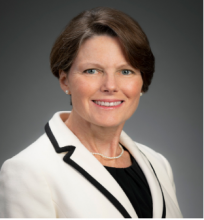
Jennifer Bogner, PhD, Division Director, Rehabilitation Psychology, Ohio State College of Medicine: As Disability co-chair for the ECLR, Dr. Bogner provides expertise on research methods and ethical issues related to individuals living with cognitive, behavioral and physical disabilities. Dr. Bogner has expertise in the conduct of longitudinal studies with persons living with disability and the development/adaptation of survey methodology to obtain valid and reliable data.

Deena Chisolm, PhD, Director, Center for Child Health Equity and Outcomes, NCH: As the URM co-chair for ECLR and a health services researcher, Dr. Chisolm’s expertise includes epidemiology, healthcare/systems transitions and health literacy assessment/tailoring, as well as the research methods for culturally respectful inclusion of racial and ethnic minorities, sexual/gender minorities and those with socio-economically needs.
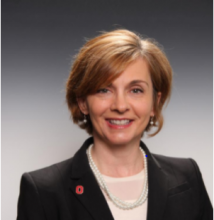
Mary Beth Happ, PhD, Associate Dean, Research and Innovation, Ohio State College of Nursing. As the ECLR Geriatric co-chair, provides expertise on research methods in aging populations and transitions in care (e.g., post-acute care, assisted living, hospice) for older adults. Dr. Happ has particular expertise in observational (e.g., in-person or video recording), qualitative and mixed methods research approaches and in research accommodations for communication disability (hearing, vision, speech).
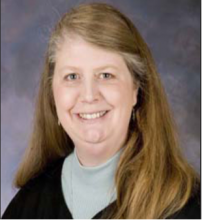
Kathryn Vannatta, PhD, Director, Biobehavioral Outcomes Core, NCH: As Pediatric co-chair for the ECLR, Dr. Vannatta provides expertise in life span development, research ethics, study design and selection of measures and mixed methods appropriate to diverse populations of interest.
Request for Applications for Projects
Please note that the application deadline has passed.
Eligibility
Potential applicants are strongly encouraged to contact the ISP Pilot Program prior to proposal development. The Executive Committee on Lifespan Research (ECLR) oversees the ISP Pilot Program and is comprised of clinical and research faculty with extensive expertise on special populations across the lifespan. These faculty members are available to assist investigators in integrating special populations in research, including providing one-on-one or team consultations.
If you are interested in meeting with the ECLR, please contact the Nationwide Children's Hospital / Ohio State CCTS.
Effective beginning the 2020-2021 cycle, all applicants are now required to schedule a meeting with CCTS Regulatory prior to submitting a proposal.
Please contact CCTS Concierge.
Due to the high volume of requests the office receives, it is recommended that prospective applicants contact CCTS Regulatory at least 4-6 weeks prior to the application deadline, to ensure that their request can be accommodated in a timely manner.
Project Eligibility
To be eligible for pilot funding, proposals must focus on a methods-related, biomedical and/or psychosocial health-related research problem in one or more special population group. All projects must investigate special populations or methods related to including special populations in research. However, proposals do not need to exclusively focus on special populations. Studies that compare the general population versus a special population, for instance, are still eligible for pilot funding.
Additionally, active recruitment of new participants is not a project requirement. Particular consideration will be given for projects that also involve lifespan research across Ohio State and Nationwide Children's Hospital.
Project Examples
Examples of proposals that include a special population:
- Improving informed consent processes for individuals with cognitive deficits
- Adapting an randomized controlled trial to improve adherence to treatment for Spanish-speaking families
- Reducing health disparities for infants with Neonatal Abstinence Syndrome and their mothers
For more information on research participation of special populations, challenges involved in their inclusion, and recommendations for alternative study designs, please see the following article in JAMA: Spong CY, Bianchi DW. Improving Public Health Requires Inclusion of Underrepresented Populations in Research. JAMA. Published online December 28, 2017. doi:10.1001/jama.2017.19138.
Applicant Eligibility
ISP pilot funds are available to investigators holding clinical or research faculty appointments at Ohio State or Nationwide Children's Hospital.
- Ohio State Faculty: Tenure-track, clinical, and research faculty with appointments at any College at The Ohio State University (not solely Health Sciences). For PI eligibility at Ohio State, please visit: http://research.osu.edu/award-lifecycle/how-to-be-a-p-i/.
- Clinical Faculty: Individuals with primary appointment in a clinical division, who are not Principal Investigators in The Research Institute at Nationwide Children’s Hospital.
- Research Faculty: Principal Investigators in a Center at The Research Institute at Nationwide Children’s Hospital (research faculty may be clinicians who see patients).
Prior to submitting an application, applicants and mentors must have completed all necessary research training (RCR and/or GCP training, if the project involves human subjects).
Timeline and Funding Information
The ISP Pilot Program offers up to $40,000 in funding per award cycle to either one investigator or multiple investigators at Nationwide Children's Hospital/Ohio State to cover direct costs; however, no indirect support will be provided. Please note that support for faculty salaries is therefore not provided or covered as part of CCTS pilot programs.
The award period will last for 12 months, with the start date coinciding with the start of the CCTS grant year (June 1). ISP pilots do not have a mechanism for no-cost extensions. Any funds that are not spent during the annual award period will be forfeited by the investigator.
Application Deadline
Applications should be submitted online via REDCap.
Any questions related to this program, including eligibility or application consideration, can be submitted to the ECLR for the ISP Pilot Program at CCTS@NationwideChildrens.org
Review Criteria
- The proposed project scope includes one or more special populations (pediatric, geriatric, disadvantaged, etc.)
- The proposed project will lead to improvement of methods for integrating a special population into clinical and translational research.
- Priority consideration will be given to collaborative grants between Faculty at both institutions (e.g., grant applications with one Ohio State faculty member and one Nationwide Children's Hospital faculty member as co-PIs).
Review and Award Decisions
The review process and executive approval of funding will last six to eight weeks.
The latest anticipated start date for funded investigators (will be announced at the next cycle) due to the NIH requirement of NCATS Prior Approval for all CCTS pilot funding opportunities and the requirement that IRB approval be obtained prior to NCATS Prior Approval.
For more information on NCATS Prior Approval for pilot studies involving human subjects, please visit the NIH NCATS website.
Funding with Clarification and Resubmission
Due to the accelerated nature of this program, funding with clarification may be awarded to an applicant if the review committee has deemed the proposal to be within the fundable range, but in need of minor changes or clarifications. If the applicant is able to respond to comments and critiques from the review committee within the designated time frame (two to three weeks), the proposal will be funded for that application cycle.
Applicants are also welcome to resubmit their proposal for the following annual application cycle. In the event of resubmission, applicants can submit the same REDCap application and upload a revised version of their proposal with changes clearly noted.
Post-Award Requirements
As a requirement of the award, award recipients must complete a final progress report documenting any conference presentations, posters, publications and subsequent internal/external grants resulting from their ISP pilot project. All published work (abstracts, publications, etc.) supported by an ISP pilot grant must cite the CTSA grant number (UL1TR002733) and be submitted to PubMed Central.
Proposals funded for GY01 and GY02
